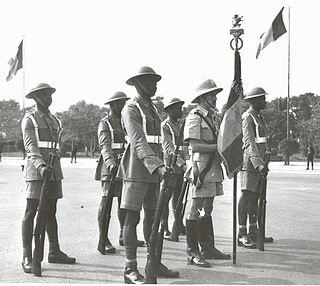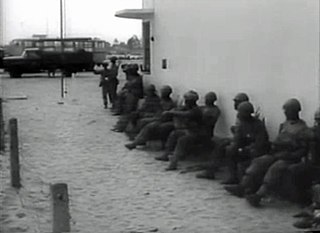Related Research Articles
The Armed Forces of the Republic of the Congo, also less formally denoted as the Forces armées congolaises or its acronym FAC, are the military forces of the Republic of the Congo. They consist of the Congolese Army, the Congolese Air Force, the Congolese Marine (Navy), and the Congolese National Gendarmerie. The dissolution of French Equatorial Africa in 1958, and France's impending military withdrawal from the Congo in August 1960, provided the impetuous for the formation of the FAC. The FAC and state paramilitary agencies are headed by an Armed Forces Chief of General Staff, usually appointed by the President of the Republic of the Congo. Major General Guy Blanchard Okoï has served as chief of staff since 2012.

Law enforcement in France has a long history dating back to AD 570, when night watch systems were commonplace. Policing is centralized at the national level. Recently, legislation has allowed local governments to hire their own police officers which are called the "police municipale".

The Force Publique was a gendarmerie and military force in what is now the Democratic Republic of the Congo from 1885, through the period of Belgian colonial rule. The FP was retitled as the Congolese National Army or ANC in July 1960 after independence.
Authority and management of civil law and order in Algeria is shared by the Sûreté Nationale, or Directorate General for National Security (DGSN), the civilian police force, under the Ministry of Interior, and the Gendarmerie Nationale under the Ministry of National Defence.
The La Direction Générale de la Sûreté Nationale is the authoritative and main State police body of Morocco. The Sûreté Nationale is tasked with upholding the law and public order. It works alongside the Gendarmerie Royale and the Forces Auxiliaires.

As in many other countries with a French colonial heritage, law enforcement in Benin was a responsibility primarily shared by a gendarmerie and a police force. Since January 2018, the Republican Police of Benin is the unique law enforcement force.
Like many other countries with a French colonial heritage, law enforcement in Burkina Faso is a responsibility primarily shared by the gendarmerie and the police.

The principle law enforcement agency in Burundi is the National Police of Burundi. The police falls within the jurisdiction of the Ministry of Public Security. It is separate from the National Intelligence Service (SNR), the state intelligence agency.
The Gendarmerie Nationale and the national police are responsible for law enforcement in Cameroon

The Gendarmerie Nationale and the Police Nationale are the national police forces of Chad.
The law enforcement agencies of Madagascar include:

The Gendarmerie Nationale is the national police force of Mauritania. The gendarmerie is part of the army and maintains posts in the urban and rural parts of the country.
Responsibility for law enforcement in Togo is primarily shared by the Police nationale, the civilian national police, and the paramilitary Gendarmerie nationale togolaise.

Law enforcement in the Democratic Republic of the Congo has historically been focused on furthering the state's aims with no regard for human rights. The Police nationale congolaise is the police throughout the territory of the Democratic Republic of the Congo. It was composed of between 110,000 – 150,000 officers as of 2010.
Law enforcement in the Central African Republic is primarily vested in the country's National Police, a uniformed civilian branch oriented almost solely towards law enforcement in urban districts, and the paramilitary Central African Gendarmerie. A third department, the Police judiciaire, is the criminal investigation division of the National Police but has become increasingly independent and is widely considered a separate branch in its own right.

The Congolese National Liberation Front is a political party. Funded by rebels of Katangese origin, and composing of ex-members of the Katangese Gendarmerie, it was mainly active in Angola and Zaire during the 1970s.
The Congolese National Convention, also known as CONACO, was a political alliance in the Democratic Republic of the Congo.
Mass media in the Republic of the Congo are severely restricted by many factors, including widespread illiteracy and economic underdevelopment.

The Congolese National Police is the national police force of the Democratic Republic of the Congo. The national police consists of 110,000–150,000 officers and operates on the provincial level, answering to the Interior Ministry. It is known in the DRC for corruption, repression of political dissidents, and other human rights abuses. It is currently undergoing reforms. A police academy is being built.

On 5 July 1960, soldiers of the garrisons of Léopoldville and Thysville of the Force Publique, the army of the newly independent Democratic Republic of the Congo mutinied against their white officers. The revolt quickly spread throughout the Lower Congo and engulfed the country in disorder, beginning the Congo Crisis.
References
- World Police Encyclopedia, ed. by Dilip K. Das & Michael Palmiotto published by Taylor & Francis. 2004,
- World Encyclopedia of Police Forces and Correctional Systems, second edition, 2006 by Gale.
- Sullivan, Larry E. Encyclopedia of Law Enforcement. Thousand Oaks: Sage Publications, 2005.
| This law enforcement–related article is a stub. You can help Wikipedia by expanding it. |
| This Republic of the Congo-related article is a stub. You can help Wikipedia by expanding it. |